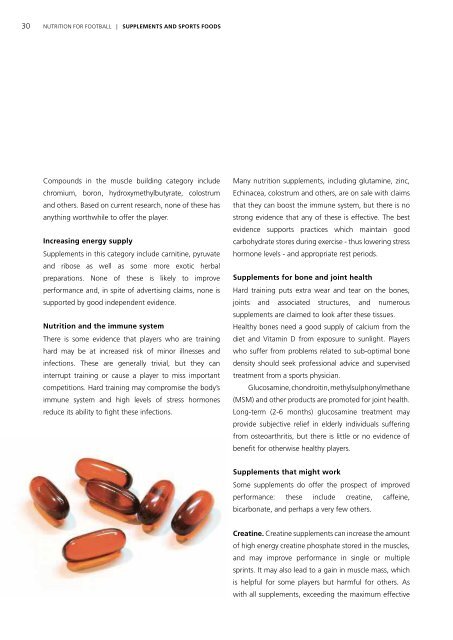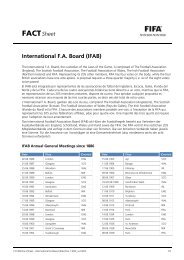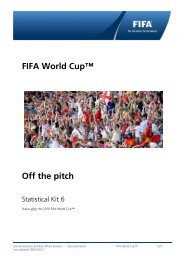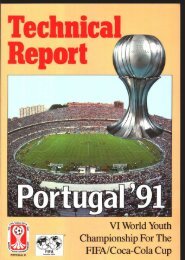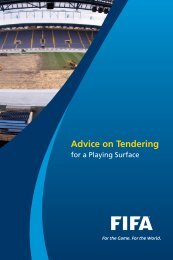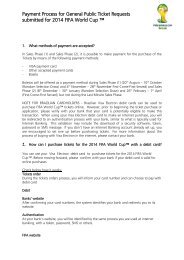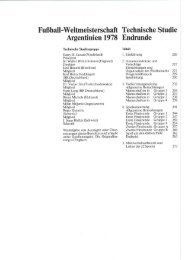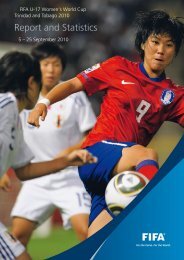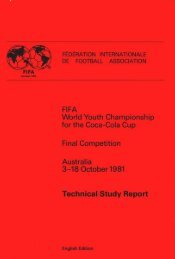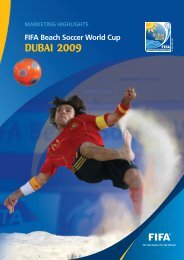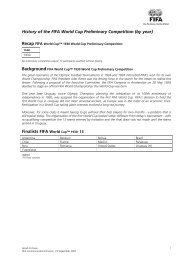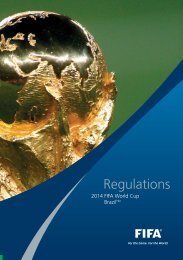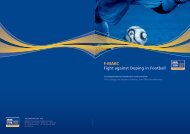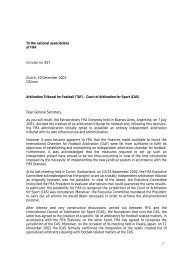Nutrition for football - FIFA.com
Nutrition for football - FIFA.com
Nutrition for football - FIFA.com
You also want an ePaper? Increase the reach of your titles
YUMPU automatically turns print PDFs into web optimized ePapers that Google loves.
30 NUTRITION FOR FOOTBALL | SuPPlEMENtS aNd SPortS FoodS NUTRITION FOR FOOTBALL | SuPPlEMENtS aNd SPortS FoodS 31<br />
Compounds in the muscle building category include<br />
chromium, boron, hydroxymethylbutyrate, colostrum<br />
and others. Based on current research, none of these has<br />
anything worthwhile to offer the player.<br />
increasing energy supply<br />
Supplements in this category include carnitine, pyruvate<br />
and ribose as well as some more exotic herbal<br />
preparations. None of these is likely to improve<br />
per<strong>for</strong>mance and, in spite of advertising claims, none is<br />
supported by good independent evidence.<br />
<strong>Nutrition</strong> and the immune system<br />
There is some evidence that players who are training<br />
hard may be at increased risk of minor illnesses and<br />
infections. These are generally trivial, but they can<br />
interrupt training or cause a player to miss important<br />
<strong>com</strong>petitions. Hard training may <strong>com</strong>promise the body’s<br />
immune system and high levels of stress hormones<br />
reduce its ability to fight these infections.<br />
Many nutrition supplements, including glutamine, zinc,<br />
Echinacea, colostrum and others, are on sale with claims<br />
that they can boost the immune system, but there is no<br />
strong evidence that any of these is effective. The best<br />
evidence supports practices which maintain good<br />
carbohydrate stores during exercise - thus lowering stress<br />
hormone levels - and appropriate rest periods.<br />
Supplements <strong>for</strong> bone and joint health<br />
Hard training puts extra wear and tear on the bones,<br />
joints and associated structures, and numerous<br />
supplements are claimed to look after these tissues.<br />
Healthy bones need a good supply of calcium from the<br />
diet and Vitamin D from exposure to sunlight. Players<br />
who suffer from problems related to sub-optimal bone<br />
density should seek professional advice and supervised<br />
treatment from a sports physician.<br />
Glucosamine, chondroitin, methylsulphonylmethane<br />
(MSM) and other products are promoted <strong>for</strong> joint health.<br />
Long-term (2-6 months) glucosamine treatment may<br />
provide subjective relief in elderly individuals suffering<br />
from osteoarthritis, but there is little or no evidence of<br />
benefit <strong>for</strong> otherwise healthy players.<br />
Supplements that might work<br />
Some supplements do offer the prospect of improved<br />
per<strong>for</strong>mance: these include creatine, caffeine,<br />
bicarbonate, and perhaps a very few others.<br />
creatine. Creatine supplements can increase the amount<br />
of high energy creatine phosphate stored in the muscles,<br />
and may improve per<strong>for</strong>mance in single or multiple<br />
sprints. It may also lead to a gain in muscle mass, which<br />
is helpful <strong>for</strong> some players but harmful <strong>for</strong> others. As<br />
with all supplements, exceeding the maximum effective<br />
dose is not helpful. Creatine is normally found in meat<br />
and fish, but the doses used in supplementation protocols<br />
(10-20 g per day <strong>for</strong> 4-5 days to load, and 2-3 g per day<br />
<strong>for</strong> maintenance) are more than is found in normal foods.<br />
There is some evidence that creatine supplements can<br />
also help increase glycogen storage in muscle. Creatine<br />
supplementation appears not to be harmful to health.<br />
caffeine. A small amount of caffeine (2-3 mg/kg) can<br />
help per<strong>for</strong>mance in prolonged exercise and may also be<br />
helpful in exercise of shorter duration. Such moderate<br />
doses can be found in everyday amounts of coffee, cola<br />
drinks and some sports products (e.g. gels, some sports<br />
drinks). For example, 100 mg of caffeine is supplied by a<br />
small cup of brewed coffee or 750 ml of a cola drink.<br />
Larger doses of caffeine do not seem to be more effective,<br />
and may have negative out<strong>com</strong>es such as over-arousal<br />
and poor sleep patterns after an event.<br />
Bicarbonate. In very hard exercise, the muscles produce<br />
lactic acid. This is both good (giving energy to allow hard<br />
ef<strong>for</strong>ts) and bad (causing pain and interfering with<br />
muscle function). In the same way that excess stomach<br />
acidity can be buffered by taking bicarbonate, so sodium<br />
bicarbonate (in a dose of about 0.3 g per kg body weight)<br />
be<strong>for</strong>e an event can counter the negative effects of lactic<br />
acid. Bicarbonate supplements are widely used by<br />
athletes in events that cause fatigue within a few minutes<br />
and there is now evidence of possible benefits from<br />
studies designed to simulate the activity patterns of<br />
<strong>football</strong> players. There is a real risk of gastrointestinal<br />
problems and players should experiment in training.<br />
Another buffering supplement that is gaining attention<br />
is beta-alanine. More work is needed on beta-alanine to<br />
know if it can be of benefit to <strong>football</strong> play. However,<br />
players should be warned that a <strong>com</strong>mon side-effect of<br />
most beta-alanine supplements is an un<strong>com</strong><strong>for</strong>table<br />
prickling sensation that lasts <strong>for</strong> about an hour.<br />
A number of sports foods have been developed to<br />
supply a specific <strong>for</strong>mulation of energy and nutrients in<br />
a <strong>for</strong>m that is easy to consume. These can be valuable in<br />
allowing players to meet their special nutrition needs<br />
when everyday foods are unavailable or impractical to<br />
eat. This is most often the case just prior to, during, or<br />
after an exercise session. Examples of useful sports<br />
foods include:<br />
• sports drinks (providing fluid and carbohydrate during<br />
exercise),<br />
• sports gels (additional carbohydrate intake, especially<br />
during exercise)<br />
• liquid meals (carbohydrate, protein, vitamins and<br />
minerals <strong>for</strong> a pre-event meal, post-exercise recovery<br />
or a high-energy diet)<br />
• sports bars (carbohydrate, protein, vitamins and<br />
minerals – often a solid <strong>for</strong>m of the liquid meal).<br />
Of course, the relatively high cost of these sports foods<br />
must be taken into account when deciding whether to<br />
use them.<br />
All players should look carefully at<br />
the risks and rewards of individual<br />
supplements be<strong>for</strong>e trying them.


